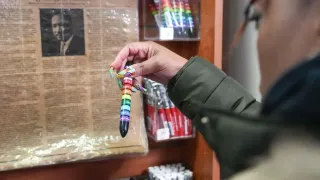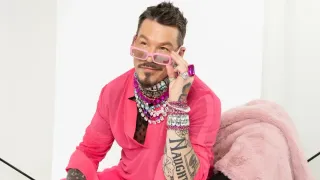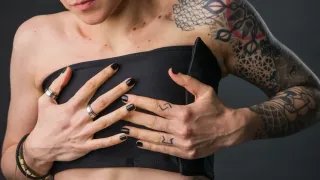June 22, 2023
12 More Standout Films Watched at Tribeca 2023
Frank J. Avella READ TIME: 13 MIN.
With the Tribeca Film Festival now over, this year has proven to be one of the richest in terms of eclectic quality selections. Even the films that were not my particular shot of whiskey had either fascinating narratives, standout performances, or ambitious themes. The Fest continues virtually through July 2nd, so there is still time to binge a host of terrific titles being offered via the "Tribeca at Home" online platform.
Here are 12 outstanding recommendations. These are in addition to 12 earlier recommendations.
'The Miracle Club'
It's taken 20 years for the story of four deeply damaged Irish women who depart Dublin for an almost desperate pilgrimage to the French town of Lourdes, where miracles are alleged to occur, to reach the screen. In all that time, Maggie Smith never wavered in her attachment to the project. Now, finally, this penetrating and powerful story sees the light of cinematic day, directed by Thaddeus O'Sullivan and written by Jimmy Smallhorne, Timothy Prager and Joshua D. Maurer, and starring the Mount Rushmore acting trio of Laura Linney, Kathy Bates and the Dowager Countess herself, Smith. The film is set in 1967, as the once-banished Chrissie (Linney) returns home for her mother's funeral, much to the consternation of Eileen (Bates), her best friend from some 40 years ago, and Lily (Smith), her mother's confidante. Lily and Eileen, along with their younger neighbor Dolly (Agnes O'Casey), dream of winning a talent contest so they can journey to Lourdes. Each has their own reasons for needing to go. When Chrissie joins them on the bus, the drama truly begins, with past wounds being torn open and deep-seated trauma exposed. The damning dictates of the Catholic Church hang over these women like a dark cloud. Can they find a way to heal? Come awards season, attention must be paid.
'Bucky F*cking Dent'
David Duchovny's sophomore directorial outing, "Bucky F*cking Dent," scores a triple (that's one base shy of a home run). Based on Duchovny's novel, and adapted by the "Californication" star, this funny, bittersweet (possibly autobiographical?) film, set in New Jersey in the summer of 1978, follows Teddy (a terrific Logan Marshall-Green), a 33-year-old peanut vender and wannabe writer who finds out his estranged dad, Marty (Duchovny), is dying of cancer. Teddy decides to care for him – let the clashing begin. We've seen father/son dysfunctional dramedies many times before, but what makes "Bucky" stand apart from most, besides Marty's fervent devotion to the Red Sox, is just how much earnest love we feel from these two, thanks to the off-the-charts familial chemistry between Marshall-Green and Duchovny. Marty has an 11th hour speech that, delivered by another actor, might have gone wrong. Duchovny hits all the right notes (it is his material, after all) and just destroys us – in the best way. The film's only flaws are an unnecessary coda and a time misplacement of Carter's "crisis of confidence" speech, but that's nitpicky. "Bucky F*cking Dent" is super fucking awesome!
'Chasing Chasing Amy'
Full disclosure: I'm a sucker for documentaries about cinema. That said, they do seem to usually follow a certain safe pattern, and never seem to dig deep enough. Sav Rogers, a trans man who watched "Chasing Amy" as a 12-year-old and credits the film with saving his life, has made a truly bold doc that dares to reveal uncomfortable truths. "Chasing Chasing Amy" features interviews with filmmaker Kevin Smith and a brutally honest Guinevere Turner (writer of "Go Fish") upon whom the character Amy was based. ("What emerged was that Kevin got an empire and we were just some dykes.") Late in the doc, Joey Lauren Adams (Amy) is finally given an opportunity to speak her painful, honest truth. Adams deserves to be rediscovered, and Rogers deserves a career as a filmmaker.
'The Line'
Ethan Berger's feature narrative debut, "The Line," shows a strong grasp of the visual medium and an impressive ability to dive into themes that attack class, wealth, and power, especially when it comes to the most elite students in the good ol' U.S. of A. The sophomores at Berger's fictional college fraternity, Kappa Nu Alpha, are about to indoctrinate their freshman pledges, and this allows the filmmaker to explore the misguided traditions – sexism, racism and homophobia (despite the obvious homoerotic behavior) – inherent in these fraternities... ergo, in our culture. Alex Wolff delivers a searing turn as our conflicted young protagonist. My only gripe is that the villain and his fellow frat boys are so despicable, it's easy to get disgusted and want to give up on the film. (A bit more character nuance would have gone a long way.) Perhaps that's part of the point: That so many of our future leaders cut their moral and ethical teeth on these antiquated traditions, and their lacking in those areas is passed down through generations. Rest assured this in no "Animal House"; it's a disturbing peek into a world many of us suspected exists, and one that needs to be destroyed.
'Waitress, the Musical - Live on Broadway!'
Unlike most of the attendees at my Tribeca screening, I had never seen "Waitress" on Broadway. I felt like an interloper, with three fans next to me gleefully boasting about having seen the stage production four times. As the credits to "Waitress, the Musical - Live on Broadway!" rolled, I was sorry I had missed this delicious concoction about love, friendship, and female empowerment, and was truly appreciative that this musical adaptation of the late Adrienne Shelley's lovely indie film was captured on film for posterity. Diane Paulus directed the show, which has a book by Jessie Nelson and music and lyrics by Sara Bareilles, who stars in this production. The original Broadway show had several names in the lead role during its run, including the amazing Katharine McPhee and Jessie Mueller, who originated the part of Jenna. For the screen, director Brett Sullivan inserts his camera directly into the action, circling around certain musical numbers.
The plot has Jenna, a pie maker extraordinaire, stuck in a podunk town with an abusive husband and a baby on the way. Bareilles, so good in the Broadway revival of "Into the Woods" a few months ago (and Tony nominated), is splendid here, especially when delivering her Act 2 tour de force, "She Used to Be Mine." Sure, the show can be super-sugary and sentimental, but I was sold. And now I am hungry for pie.
'LaRoy'
First-time writer-director Shane Atkinson proves a significant talent with the twisty, evocative "LaRoy," even though his female characters are way too thinly drawn, and he relies a bit too much on appropriating from Tarantino, the Coens, and other "cool" filmmakers. Ray Jepson (John Magaro) is a poor, pathetic shlub who seems to be the only person in town who doesn't know that his wife, Stacy-Lynn (Megan Stevenson), is cheating on him. I won't reveal with whom, but it becomes obvious after the first 15 minutes. When his P.I. bud, Skip (Steve Zahn, fab), shows him unsolicited proof, he decides to kill himself and, instead, gets wackily embroiled in a plot to murder the town's attorney for the money in his safe. What "LeRoy" does so well is depict the trapped and dreary small-town milieu. Everyone except for sad Ray wants to escape, but few can. Dylan Baker – so evil in Prime's brilliant "Hunters" – walks away with all his scenes as a visitor to town. I'd love to see a film exclusively about his character.
'Downtown Owl'
First-time directors Lily Rabe and Hamish Linklater's adaptation of Chuck Klosterman's 2008 novel begins promisingly enough and sustains the dramatic and satiric tension it establishes until its murky and unsatisfying ending (which had the makings of a truly amazing finale). Coming to the film with no previous knowledge of the acclaimed book, it's impossible to know where the blame lies. But the mostly-engaging film is still worth seeing, and is anchored by a daring, unhinged, beguiling turn by Rabe as a new teacher who arrives in the small town of Owl, North Dakota, in 1983, to get away from her unfulfilling life. There, she meets a host of odd characters who seem to all have secrets (or are keeping secrets), including bison owner Vance Druid (Henry Golding), whom she crushes on. Rabe reminded me so much of her mom, Jill Clayburgh, in this film, not just for the resemblance but in her risk-taking. Finn Wittrock and Vanessa Hudgens have a blast, killing in all their too-brief scenes. And students (and football players) August Blanco Rosenstein and Jack Dylan Grazer also impress.
'Transition'
Jordon Byron and Monica Villamizar's "Transition" is one of those docu-mindfucks where, while watching it, you think, "No, this can't really be happening?" Byron is to be applauded for his daring and his filmmaking. As a conflict documentarian for the New York Times and a trans man, he puts himself on the front lines, literally risking his life by filming the goings-on of a Taliban unit that has just seized Kabul in Afghanistan. Byron decides to document his own story as he awaits gender transition and develops a complex relationship with the Taliban, as well as colleagues Kiana, a photojournalist, and Teddy, his cameraman. What makes this so riveting, besides the obvious, is Byron's ethical dilemma about deceiving his subjects and his feelings of comfort in a place where there is only unrest and danger. In Dari, Farsi, and English, with English subtitles.
'He Went That Way'
We've had a bounty of "hooker with the heart of gold" movies throughout cinema history, but the late Jeffrey Darling's seductive, semi-creepy character study, "He Went That Way," might just be the first "serial killer with a heart of gold" film. Part road movie, part homoerotic tet-a-tet, this gorgeously shot work, set in 1964, is based on a true crime story. Jim (Zachary Quinto) is a celeb animal handler who offers sexy 19-year-old Bobby ("Euphoria's" Jacob Elordi) a ride along Route 66, not knowing he's a serial killer. Also in tow is the famous chimpanzee Spanky, an actual '60s TV sensation. Will Bobby kill Jim, fuck him, or just form a strange bond with him? Evan M. Wiener's sparse screenplay allows for ambiguity, but teases us with danger and a sexual payoff that never occurs. Quinto is uncomfortably strange and queerly curious as Jim. Elordi, stunningly photographed as if Tennessee Williams himself were behind the lens, has cinematic presence and magnetism to spare. One feels a bit uneasy sympathizing with a psychopath, but Elordi's work here subtly courts compassion. I just wish the film had dared to go further.
'The Graduates'
Unlike many school shooting films (and the fact that I could write that sentence makes me a little queasy), Hannah Peterson's muted and understated directorial debut "The Graduates" focuses on a group of scarred teen survivors one year after the tragedy occurs. We learn very little about the incident or the victims, and, like Gus van Sant's "Elephant," the camera does a lot of student-following and minutiae-capturing. Yet, there are truly powerful moments, especially in the latter portion. There's also a quartet of terrific performances, beginning with a deeply affecting Mina Sundwall as Genevieve, as well as Alex R. Hibbert as her friend Ben, and Maria Dizzia as her loving mother. But it's John Cho's devastating turn as the father of one of the dead that is most moving and elevates the film to another level.
'Dead Girls Dancing'
High school has just ended for three German girls, Ira, Malin, and Ka, and they decide to celebrate by road tripping to Italy. Along the way, they pick up hitchhiker Zoe, after causing mayhem at an Italian hotel. While fleeing, their car breaks down and they come upon an abandoned village, where they proceed to take over and party – that is until they're discovered. First-time feature filmmaker Anna Roller has fashioned an intriguing film that melds a few genres while never losing focus on our four protagonists, two of which are attracted to one another. "Dead Girls Dancing" soars in the second half when it gains energy and momentum, pivoting from its moody and somber tone to a more exciting and stakes-raising one. In German, French, Italian, and English, with English subtitles.
'The Adults'
Writer-director Dustin Guy Defa has crafted a sweet, if slight, portrait of three siblings and their dysfunctional dynamics. Eric (Michael Cera) has returned home after three years, ostensibly to visit his two sisters, Rachel (Hannah Gross) and Maggie (Sophia Lillis), but he would much rather play poker with his buddies. "The Adults" never delves deep enough, but is worthwhile for its three central performances, especially Gross and Lillis, whose facial expressions speak volumes in terms of conveying past trauma and disappointment.






